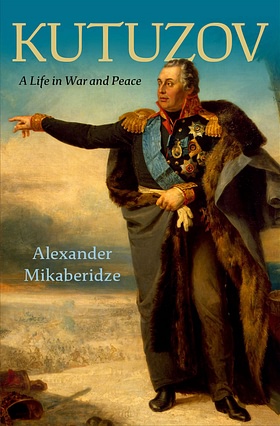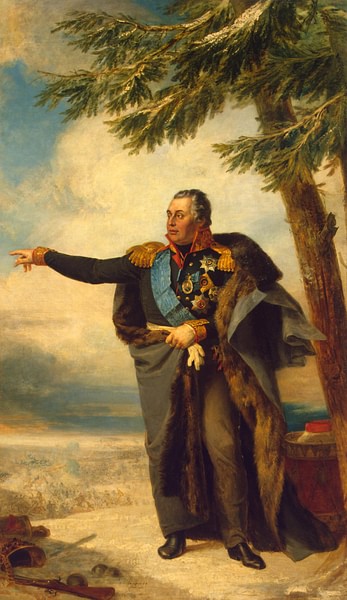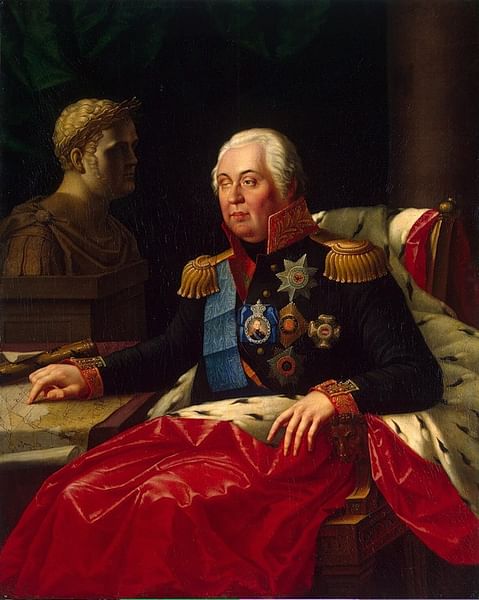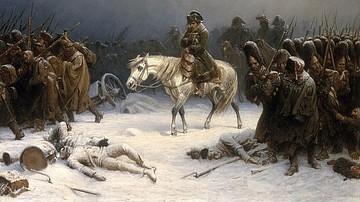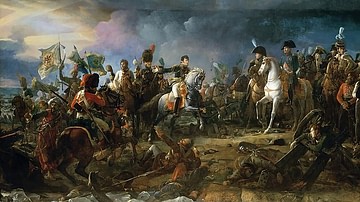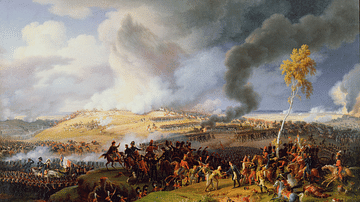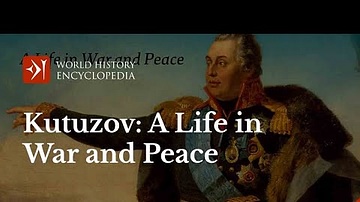Join World History Encyclopedia as they have a chat with author Alexander Mikaberidze all about his new book Kutuzov: A Life in War and Peace, published by Oxford University Press.
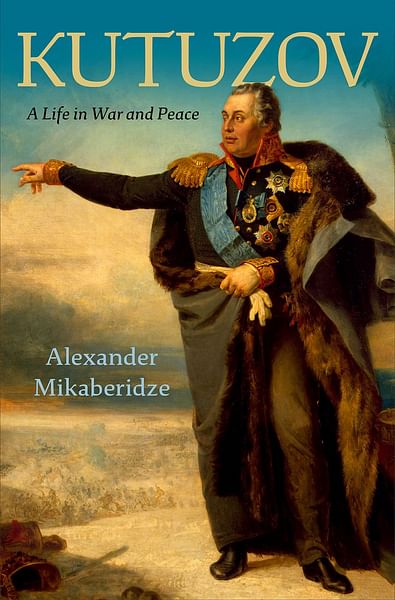
Kelly: Thank you so much for joining me today, Alex. It is a pleasure talking to you. You are the author of Kutuzov: A Life in War and Peace. Would you like to start off by telling us what the book is all about?
Alex: Oh, yes. The book is about a character, a historical figure, but also the main protagonist of the book that many people claim to have read, but very few actually manage to get through, War and Peace. Those who are familiar with the novel know that the Russian field marshal who leads the Russian armies both in 1805 and then in the decisive showdown with Napoleon in 1812 was Mikhail Illarionovich Golenishchev-Kutuzov, this very interesting character that Tolstoy uses to create his own vision of what a historical figure should be like.
My book is the first modern biography of this figure. For some reason, not much attention has been paid to him. There was an earlier biography written in the 1970s, but unfortunately, it has many issues. So, I decided to write this book as a way to explore Kutuzov's life because he served in the Russian military for 54 years – it is a long career and a rather distinguished one – but also to use his life as the vehicle to re-examine the Russian imperial history in the second half of the 18th century and early 19th century, a very turbulent period. And Kutuzov, because his career was so long and successful, was involved in virtually every major political and military event that shaped the course of Russian history and, by implication, the course of Eastern European history.
There are many events that I think still reverberate to the present day. For example, the fate of the Polish-Lithuanian Commonwealth, of which modern-day Ukraine was part back then, was decided with Kutuzov's involvement. The grand issue of the day in the late 18th century, of course, was the fate of the Ottoman Empire, the so-called Eastern Question, and Kutuzov, as the Russian ambassador, was involved in this. And, of course, the showdown between the French Empire and Russian Empire in 1812 is one of those moments that really can be used as a turning point in modern history.
Kelly: Wow. Brilliant. So why do you think no one has done a biography of Kutuzov in 50+ years?
Alex: One of the reasons is, linguistic, much of the Napoleonic historiography overall is dominated by the English and French views. Overall, the Russian side, and for that matter the Italian and German sides of the Napoleonic Wars is less known, especially in the English historiography. Partly it's linguistic, partly, of course, it's ideological and political because for much of the past 200 years, there's been, at least for the past century, the ideological divide between the two sides which hampered access to archives. Therefore, we have this dearth of studies on key figures from the Russian side. So, while on the British and French side, we have biographies of all major figures and even most of the secondary generals. And then there's Kutuzov, a man who was the supreme commander of the Russian forces in 1812 and then led the Allied forces in the beginning of 1813 campaign against Napoleon. His biography has not been written, as you said, in five decades. That's, I think, one of the reasons also that I wanted to write this book is to showcase the diversity of viewpoint that we still need when dealing with the past.
I always tell my students that history is like a kaleidoscope when you look through the tube and you turn it around, and with each turn, you see these different shapes and figures emerging. Well, for me, each of those shapes is an additional source, an additional viewpoint. By writing this book, I want to enrich the Napoleonic kaleidoscope. We know what happened from the French side, and this way I want to bring the Russian side and kind of showcase what was the Russian thinking, what was the Russian decision making. I think for the readers, there will be a lot of interesting insights for why things happened the way they did. I tried to explain that as much credit as we give to Napoleon, and he does deserve it, there are many instances when his opponents, and especially with the example of his great victory at Austerlitz in 1805, it's his opponent's mistakes that really delivered the victory to Napoleon, so to speak. That's where I think this book contributes to the existing historiography.
Kelly: So, it's kind of rounding out this picture that we already have half of or three quarters of, and it's filling in the gaps. Do you have a lot of primary sources from the Russian point of view in this period and for these major events?
Alex: Yes. The Russian archives remain largely untapped by the Western historians. The Russian historiography is quite rich and diverse, but it has its own kind of pitfalls, because much of what the Russian historians focused on is about this one particular year, 1812, when, understandably, Russians are very proud about triumphing over Napoleon. But there is enormous material out there, both in print version, but most crucially in archives. I was privileged to have access to the documents from the Russian military archive. Many parts of what Eastern Europe is today, especially the Baltic states like Lithuania, were back then, part of the Russian Empire. Therefore, the local provincial archives are also very valuable since they retain much of that information that is important to reconstructing the past. And in this case, Kutuzov was Governor General of several major provinces. To reconstruct the history, I was able to access material from the Lithuanian historical archives as well.
Kelly: That's brilliant. And so, with this figure, Kutuzov, is he someone that you've wanted to write about for a while, or was it something that sort of just popped up? Tell us how you came to write this book.
Alex: Yeah, that's a great question because I certainly didn't think of writing about him until recently. He was always somewhere in the back corner of my mind because he is such an iconic presence. Having been born and raised in the Soviet Union and then having spent in the last 25, almost 30 years of my life working on Russian history, you cannot but encounter him. But I never seriously considered writing a book on him until just a few years when I was rereading War and Peace and kind of talking with my students about this grand theory that Tolstoy offers, a division of man of action. And of course, in this novel, Tolstoy creates the dichotomy of Napoleon, the man of science rational being, who wants to control historical events, who wants to be in charge. And then Kutuzov, who is portrayed as hands off, kind of understanding that there are processes that are much larger than him and he trusts the flow. It always bothered me whether that was true or not, because as a historian, you read a lot of contemporary responses, and I've read enough publications by surviving veterans of Napoleonic Wars who were complaining that what Tolstoy did was to supplant historical reality with the historical fiction.
The more I looked at it, I realised that there is not much on that subject in English, and what we do have is unfortunately very flawed and full of factual mistakes. And so that's when, about four years ago, once I was completing my last book on Napoleonic Wars, I decided, well, I think this will be a nice transition from grappling with the global history of Napoleonic Wars. Let's grapple with one man's role.
Kelly: Amazing! Do you primarily focus on just his later life and his life in the military campaigns and that side of things, or do you begin with his childhood?
Alex: Yes, I look at his entire life. He was born in 1747, passed away in 1813 so he didn't live long enough in that sense. But it was a career that was fascinating to really explore, because, as I mentioned, he joined the military when he was just twelve years old, spent the rest of his life in the military service, fought in numerous campaigns, and really went through the entirety of the military system. I jokingly refer to him as a jack of all trades because in the military service he was essentially employed in every branch, in every capacity you can imagine, from engineer to staff officer to the commander who raised infantry units, light infantry units, light cavalry units, supervised siege, and then also dabbled in diplomacy. So, a very fascinating man. And as I mentioned, the reason I really wanted to write this is not because necessarily this is about one man's life, but rather because what it tells us about the larger picture of Russian history.
One of the fascinating aspects to Kutuzov is that as accomplished as he was when he died in 1813, he had this reputation of the man who defeated Napoleon. The contemporaries knew better. They knew how flawed he was. And then what we see is the deliberate efforts by the Russian government, both imperial and Soviet, to create a national myth. So, the third reason, not just because he's an interesting guy, not just because he represents a slice of Russian imperial history, but also what it tells about use of history or misuse of history. Because by the time we get into the 20th century, you see deliberate, calculated misuse of history to create a vision of Kutuzov that does not correspond to reality. That's where I tried to point out how history can be misconstrued. It can be used for the purpose of state building, mythmaking, nationalism, and in any respect, it's still ongoing, especially with regard to use of history by the Russian government today.
Kelly: While you were researching this period of history and Kutuzov, did anything strike you as really interesting or surprising?
Alex: There are many aspects to his career that I find fascinating. One of them, for example, is his involvement in what this new generation of historians now referred to as the military enlightenment. The Enlightenment we know was this intellectual movement in the 18th century that wanted to reassess European society with this rational, sceptical mind. But over the last few years, the new historians and up and coming historians’ kind of shape this new concept of military enlightenment, where 18th century thinkers tried to rationalize war, how and why and when countries should go to war. Kutuzov, in that respect, was an important figure within Russian military enlightenment because he tried to bridge the theoretical part of it, which spoke about using education as an improvement of individuals, as crafting what one Russian enlightenment thinker said, 'new kind of people', but also practical needs of the army.
That kind of juggling of aspirational, let's create that of human beings, but also practical, where those human beings also should be able to kill other human beings, was quite an interesting aspect to research. And then, of course, Kutuzov is a controversial figure in that, because of Tolstoy, he's envisioned as that passive individual. The man who notoriously in Tolstoy's retelling, is sleeping on the eve of one decisive battle at the Austerlitz and then eats fried chicken during another great battle. I wanted to show the complexity of his personality and allow people to really enjoy learning about that other side of the coin.
Kelly: So, you're doing a big job.
Alex: It's a big book! You have to wade through 800 pages.
Kelly: But then by the end, you'll have a completely different view!
Alex: That's right! And you'll be grateful that it's only half the length of War and Peace!
Kelly: Really saving people time.
Alex: Yeah, that's right.
Kelly: If there was one thing you want people to know about your book but also Kutuzov, what would that be?
Alex: I think, it's a thing that Kutuzov himself was very adamant about. In 1805, there was this historic, epic showdown between a coalition of European powers and Napoleonic France, and the showdown took place on the fields of Austerlitz in December of 1805, and Napoleon scores what is probably the most famous of his victories, but also one of the greatest military engagements of modern history. And it happened so Kutuzov was in charge of the Allied Army, when it was crushed, but not really. And that's, I think, one of the big things I wanted to point out that to the degree to which Kutuzov's hands were hampered and to underscore what he really wanted and what he was forced to do, because that was the thing that always bothered him for the rest of his life, really, at every opportunity, he would tell people that, remember the battle we lost? Like, yeah, we do. I was not responsible for it! So, this way, I wanted to pay respect to the old man and tell people that, no, he was not responsible for that.
Kelly: Brilliant. I love that! Well, thank you so much for joining me today, Alex!
Alex: Thank you so much for having me.
